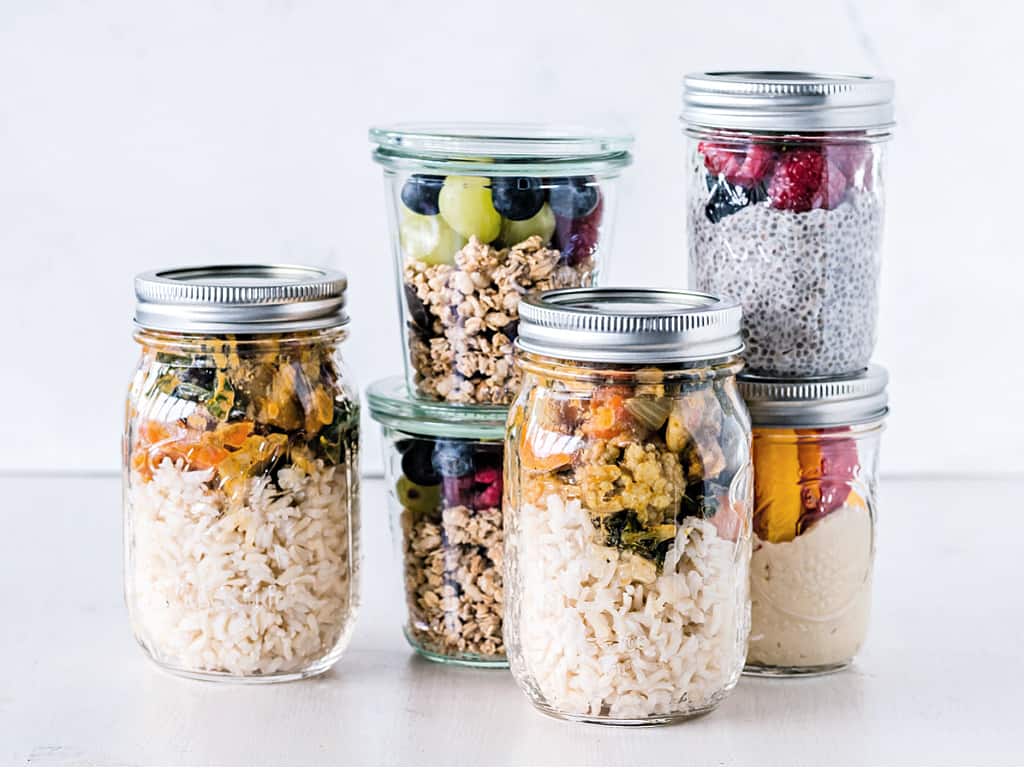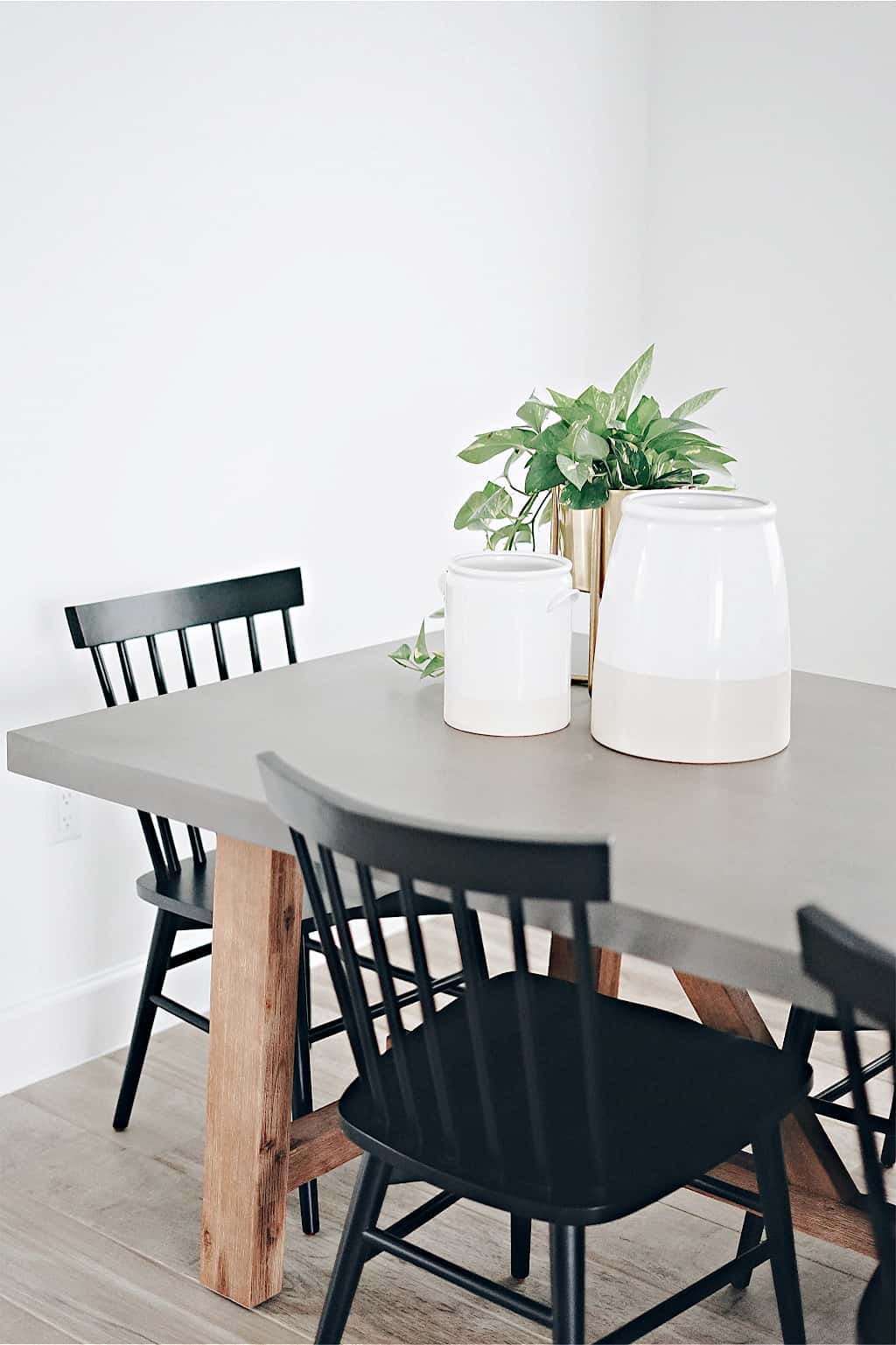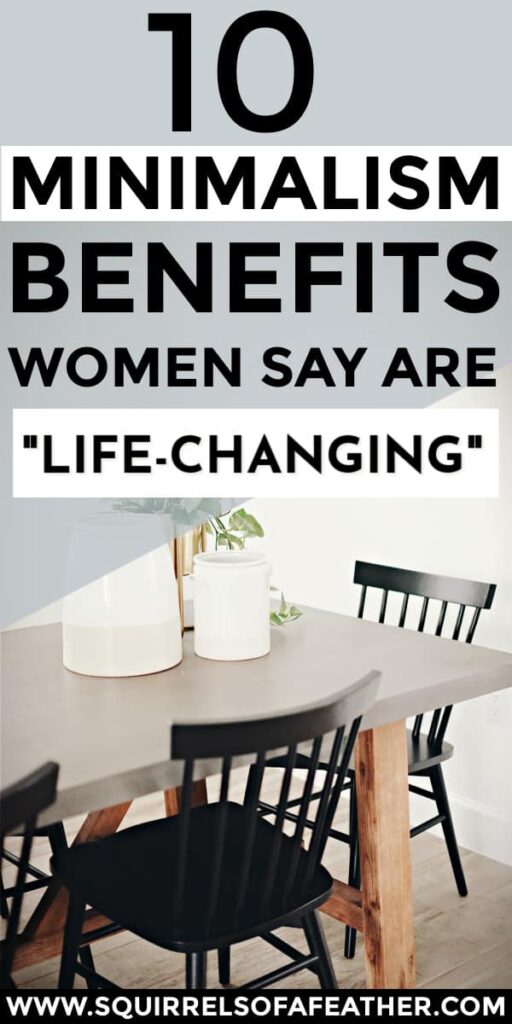10 Benefits of Minimalism (That Experts SWEAR Are True!)
This post may contain affiliate links for your convenience. That means that if you make a purchase, I will receive a small commission at no extra cost to you. Read more here.
There’s a lot of anecdotal evidence about the benefits of minimalism, but the skeptic in you may wonder, is this for real?
You can decide for yourself after reading these ten mind-blowing minimalism benefits that are actually backed by science!

Watch the video:

Share this Minimalism Benefits Info on your site
10 Benefits of minimalism
Watch this YouTube video about the benefits of minimalism; you might also enjoy learning about common characteristics that minimalist people share in this blog post.
1. Clean less
As a minimalist, you simply spend less time cleaning your house. When you own fewer items, it’s a no-brainer that you don’t need to tidy and clean up as often.
Before we extreme decluttered our entire home, it used to take me hours to tidy; now it only takes me 10-15 minutes to walk through and clear the clutter.
Also, less stuff crowing the surfaces means it’s easier to wipe, sweep, and dust – spring cleaning is a breeze!
Considering that the average working mom spends over 21 hours per week doing housework, that’s a lot of time to yourself you can get back!
✍️ NOTE: All data, statistics, quotes, and research mentioned will be linked in the footnotes at the bottom of this post for your convenience.
2. You don’t lose stuff
Before becoming a minimalist I was always losing stuff. I wasted tons of time looking for my keys, books, toys for my kids, etc.
Turns out, I’m not alone.
The average American wastes 55 minutes a day (roughly 12 days a year) looking for things they own but can’t find and $2.7 billion a year is spent replacing lost items.
One trick that minimalists use to reduce visual clutter is to give each item a “home” so they know where to find each and every item in their home.
One huge benefit of this is that EVERYONE in the home knows where that thing goes; this means husbands and kids can tidy up after themselves as well.
READ MORE: 20 Things to Let Go of for a Happier & Better Life
3. Better health
Minimalism is not only good for your home but it can also be good for your health.
Research shows that people who live in cluttered environments are more likely to have difficulty sleeping and may even eat more!
In one research study, female graduate students consumed 103 calories more in messy versus clean kitchens.
Not only that but clutter is also associated with increased weight. A 2008 study that claims people living in cluttered environments were 77% more likely to be overweight or obese.
4. It’s good for kids
I always say that massively decluttering our toys was one of the best things we ever did as a family!
Science suggests that too many toys can negatively impact children; in one study putting toddlers in a room with fewer toys (4 toys vs 16 toys), they engaged in longer periods of play with a single toy, allowing better focus to explore and play more creatively.
It’s actually a little bit scary how many toys we are giving our children!
U.S. children comprise 3.7% of children on the planet but have 47% of all toys and children’s books.
Not only that, but a study found a strong link between low self-esteem and materialism beginning in early childhood, suggesting that low self-esteem can cause materialistic tendencies. It’s a big pro of minimalism that kids are more confident and grateful (read more pros and cons of family minimalism here.)
There are so many non-toy gift options that focus on creativity and serve multiple functions, proving less is more when it comes to birthdays and Christmas — you aren’t doing kids any favors by giving them toys all the time.
Bottom line is that minimalism is actually good for kids!
READ MORE: 10 Minimalism with Kids Tips to Save Your Motherhood
5. A happier marriage
This is one of the benefits of minimalism that was so unexpected and yet oh-so-amazing to experience in our own life.
A study done by the American Psychological Association found that married couples who live in clutter-free homes had higher levels of marital satisfaction.
What this means is that less stuff can actually make your marriage stronger!
Women and men perceive and react to clutter differently, even in the same home. Women are more likely to notice clutter, which often drives up their cortisol levels.
According to the Mayo Clinic, increased cortisol is associated with:
- Depression
- Anxiety
- Digestive problems
- Heart disease
- Headaches
- Sleep problems
- Weight gain
- Memory impairment
- Concentration impairment
READ MORE: 100 Ways to Simplify Your Life and Be Happier
6. More money
My husband and I had already been practicing extreme frugal living prior to starting our minimalism journey, so we really appreciated the additional financial benefits.
Here are a few ways minimalism has improved our finances:
- Got married on a budget, no parental support, all cash
- Paying off debt (over $250k in total)
- Less spending = more money saved in the budget
- Made $50,000 selling unwanted clutter
So many Americans are just throwing money away every month, such as the $37.5 billion they spend per year on rented storage units to hold all their extra stuff.
Now is a better time than ever to start selling your weird clutter for extra cash, because the secondhand resale market is set to hit $64 billion in the next 5 years.
READ MORE: Less is More: 21 Reasons to Make it Your Life Mantra
7. Reduce environmental impact
When done right, minimalism can be very eco-friendly.
On one hand, you reduce consumption and excessive shopping, and on the other if you make wiser choices.
You can choose higher-quality items, shop for ethical and sustainable brands that do less environmental impact and choose pieces that last longer, creating less waste.
Even decluttering can be made more eco-friendly.
If and when possible try to sell or directly give away items yourself because unfortunately donation centers like Goodwill and The Salvation Army are overflowing and a lot of donations do sadly end up as trash.
But also please keep in mind that sometimes trash is just trash
Your stuff is going to deteriorate no matter what and it can either do it in your home or in a landfill.
The best thing we can do to reduce environmental waste is to change our efforts going forward. Especially with clothing; consider that 11.3 million tons of textile waste per year are tossed into landfills in the USA each year.
BE SMART: 15 Helpful Minimalist Shopping Tips to Save Money (and the Planet)
8. Life satisfaction
Life satisfaction is so hard to put your finger on, but you know when you have it and when you don’t.
Minimalism is a really great way to increase your sense of life satisfaction.
Too many of us have gotten used to judging our life in terms of what we have or don’t have.
Yet over and over, science has found that material possessions are not what makes us happy.
In fact, more possessions are NEGATIVELY correlated with life satisfaction! One study found that procrastination and clutter problems led to a decrease in life satisfaction among older adults – a significant decrease!
RELATED POST: 10 Best Minimalist Purchases of My Entire Life!

9. Better focus & productivity
In his book, Goodbye Things, Fumio Sasaki mentions the concept of a silent to-do list.
The basic principle is that everything in your home requires some kind of action, such as:
- the laundry basket crying FOLD ME
- the dirty dishes in the sink saying WASH ME
- the piles of unopened letters on the table
- the trash that needs to be taken out
- the empty refrigerator
The bigger this silent to-do list is the more overwhelming it becomes.
Science backs this up because psychologists who study cognition found that our brains are not designed for heavy-duty multitasking.
They found that doing more than one complex task at once can take a toll on your productivity.
“My goal is no longer to get more done, but rather to have less to do.”
Francine Jay
READ MORE: 8 Incredible Ways to Organize Your iPhone Apps in 2021
10. More fun & freedom
A lot of people think minimalism is boring. They think we sit in a boring empty home, with boring white walls, eat boring food, and so on and so forth.
In fact, I would say our life is more fun, colorful, and exciting now than it ever was before.
While we do have significantly fewer things, we also have a lot more FUN!
Yes, I got rid of a lot of my sentimental clutter, but every single room in my home has something special or sentimental from loved ones that have passed that I can now share with my kids.
And speaking of kids, my kids are still kids.
They have a lot of energy, they love to play, have burping contests, watch Netflix, enjoy playing with their favorite toys, and grill out with my husband and me on the balcony.
We do all the stuff “normal” families do, we just have more time, money, and freedom to do it.
Final thoughts on minimalism benefits
In short, minimalism is AWESOME!
For a long time, as a sentimental person, I struggled with being able to let go of things, be they physical or mental.
But embracing minimalism has brought me so much more joy and peace!
But don’t think you have to go as far as we did to experience the joys of living minimally and being more intentional with your life.
Start by decluttering a little bit at a time, and then decide if you want to go further.
Pin this post:

Minimalism benefits research sited:
- The average working mom spends over 21 hours per week doing housework (link)
- The average American wastes 55 minutes a day (roughly 12 days a year) looking for things they own but can’t find. (link)
- Around $2.7 billion a year is spent replacing lost items. (link)
- Female graduate students consumed 103 calories more in messy versus clean kitchens. (study)
- A 2008 study that claims people living in cluttered environments were 77% more likely to be overweight or obese. (study)
- People living in cluttered environments are more likely to have insomnia and difficulty sleeping. (study)
- In an environment with fewer toys (4 toys vs 16 toys), toddlers engaged in longer periods of play with a single toy, allowing better focus to explore and play more creatively. (study link)
- U.S. children comprise 3.7% of children on the planet but have 47% of all toys and children’s books. (link)
- A study found a strong link between low self-esteem and materialism beginning in early childhood, suggesting that low self-esteem can cause materialistic tendencies. (link)
- A 2010 study of married couples with at least one school-aged child found the wives in the study who perceived themselves as having a cluttered home or a home that needed work tended to have increased levels of cortisol throughout the day. Those who weren’t feeling cluttered, which included most of the men in the study, had cortisol levels that tended to drop during the day. (study)
- The Mayo Clinic on the long term effects of increased cortisol: (link)
- Americans will fork over $37.5 billion this year on storage, at an average cost of about $90 a month. The most common unit rented measures 10 feet by 10 feet, enough to store two to four rooms’ worth of furniture. (info link)
- The secondhand resale market is set to hit $64 billion in the next 5 years and is expected to overtake the traditional thrift and donation segment by 2024. (link)
- Landfills in the USA receive 11.3 million tons of textile waste per year (link)
- A study found that procrastination and clutter problems led to a significant decrease in life satisfaction among older adults. (link)
- Multiple topics regarding discussion that possessions don’t make us happy (link)
- Psychologists who study cognition found that our brains are not designed for heavy-duty multitasking and doing more than one complex task at once can take a toll on productivity (link)
- Around the globe, women spend twice as much time as men on unpaid work, including cooking, cleaning, and child or parental care – that’s an average of 4.5 hours a day. (link)
